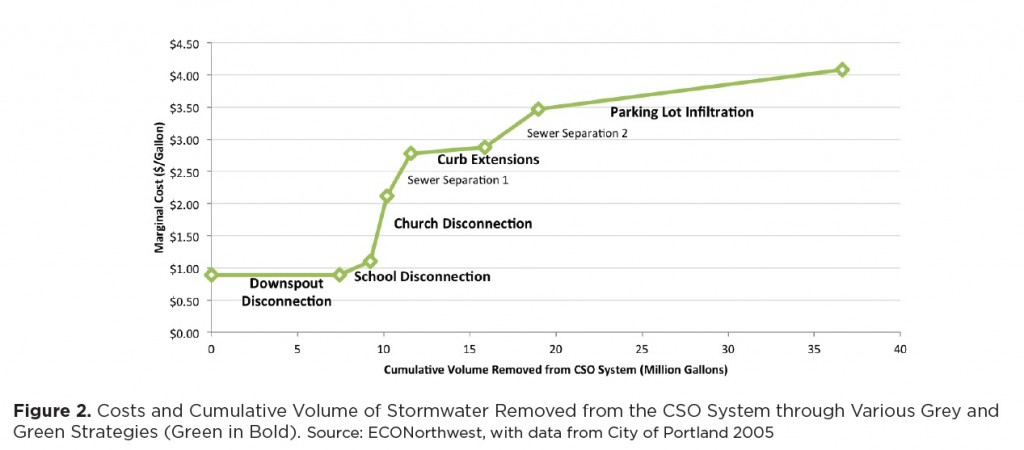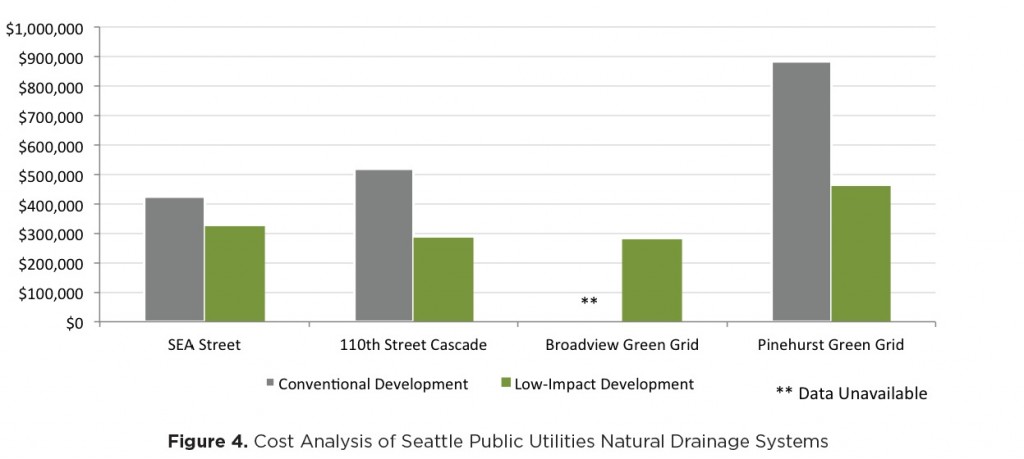A JOINT REPORT
AMERICAN RIVERS – AMERICAN SOCIETY OF LANDSCAPE ARCHITECTS – ECONORTHWEST – WATER ENVIRONMENT FEDERATION
Executive Summary
This report focuses on the economic impacts caused by polluted urban runoff, also known as “stormwater,” a significantly growing source of water pollution in the United States. It’s not intended to be an academic or technical document, but instead to be an “easy to read” compendium of current experiences, analysis and knowledge. Our goal is to provide something useful for municipal and utility officials, local, state and national elected representatives, and the general public. As stormwater professionals and researchers gather more information about the performance of green infrastructure, and refine the techniques that fall in this category of stormwater management, it’s important to translate their findings into useful information for policy makers and others. Information about the economics of green infrastructure and about stormwater more broadly is critical to our ongoing conversations about the shape of our communities and the infrastructure they depend upon.
The impacts of stormwater pollution and the need to provide stormwater prevention, management, and treatment all create costs for communities and their residents. These costs can often be offset or reduced by making different choices about how we build communities and infrastructure. By incorporating “green infrastructure” practices in efforts to control stormwater runoff, communities and property developers can reduce energy costs, diminish the impacts of flooding, improve public health, and reduce overall infrastructure costs. In addition, these practices, which rely on natural processes like evaporation, infiltration, and plant transpiration, can effectively and affordably complement traditional “grey” infrastructure, giving stormwater managers the ability to create integrated solutions to better serve their communities. Shifting to this new paradigm also creates more sustainable communities that are better able to meet future challenges, especially in the face of a changing climate.
Download the full report (PDF): Banking on Green
About American Rivers
www.americanrivers.org
“American Rivers is the leading organization working to protect and restore the nation’s rivers and streams. Rivers connect us to each other, nature, and future generations. Since 1973, American Rivers has fought to preserve these connections, helping protect and restore more than 150,000 miles of rivers through advocacy efforts, on-the-ground projects, and the annual release of America’s Most Endangered Rivers®.”
About the American Society of Landscape Architects
www.asla.org
“Founded in 1899, ASLA is the national professional association for landscape architects, representing 17,000 members in 48 professional chapters and 68 student chapters. The Society’s mission is to lead, to educate, and to participate in the careful stewardship, wise planning, and artful design of our cultural and natural environments. Members of the Society use the “ASLA” suffix after their names to denote membership and their commitment to the highest ethical standards of the profession.”
About ECONorthwest
www.econw.com
“ECONorthwest has been helping clients solve problems and make data-driven decisions since 1974. Our consultants provide expertise in economics, finance and planning to public- and private-sector clients worldwide.”
About the Water Environment Federation
www.wef.org
“Founded in 1928, the Water Environment Federation (WEF) is a not-for-profit technical and educational organization of 36,000 individual members and 75 affiliated Member Associations representing water quality professionals around the world. WEF members, Member Associations, and staff proudly work to achieve our mission to provide bold leadership, champion innovation, connect water professionals, and leverage knowledge to support clean and safe water worldwide. “
Tags: American Rivers, American Society of Landscape Architects, ASLA, Banking on Green, Drainage Systems, ECONorthwest, stormwater, Water Environment Federation, WEF








 RSS Feed
RSS Feed